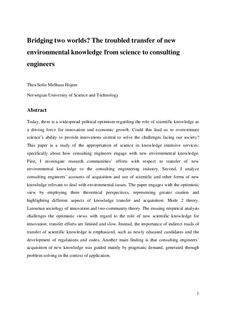Bridging two worlds? The troubled transfer of new environmental knowledge from science to consulting engineers
Journal article, Peer reviewed
Accepted version
Permanent lenke
http://hdl.handle.net/11250/2451985Utgivelsesdato
2012Metadata
Vis full innførselSamlinger
Sammendrag
Today, there is widespread political optimism regarding the role of scientific knowledge as a driving force for innovation and economic growth. Could this lead us to overestimate science’s ability to provide innovation central to solving the challenges facing our society? This article is a study of the appropriation of science in knowledge intensive services: specifically, about how consulting engineers engage with new environmental knowledge. First, I investigate research communities’ efforts with respect to transfer of new environmental knowledge to the consulting engineering industry. Second, I analyse consulting engineers’ accounts of acquisition and use of scientific and other forms of new knowledge relevant to dealing with environmental issues. The article engages with the optimistic view by employing three theoretical perspectives, representing greater caution and highlighting different aspects of knowledge transfer and acquisition: Mode 2 theory, Latourian sociology of innovation and two-community theory. The ensuing empirical analysis challenges the optimistic views with regard to the role of new scientific knowledge for innovation; transfer efforts are limited and slow. Instead, the importance of indirect roads of transfer of scientific knowledge is emphasized, such as newly educated candidates and the development of regulations and codes. Another main finding is that consulting engineers’ acquisition of new knowledge was guided mainly by pragmatic demand, generated through problem-solving in the context of application.
